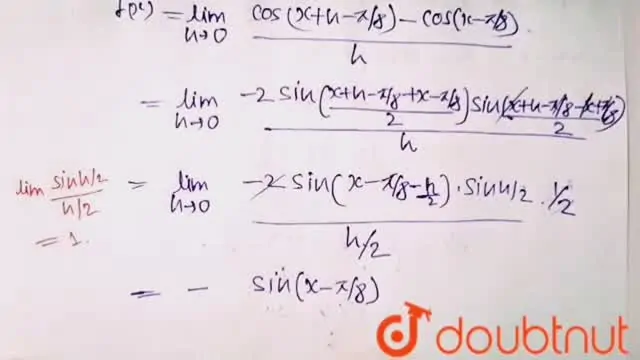Find the derivative of the following functions from first principle:
(i) -x (ii) (−x)−1 (iii) sin(x+1) (iv) cos(x−π8)
(i)let f(x)=x
we need to find the derivative of f(x)
we know that f'(x)=limh→0f(x+h)−f(x)h
f'(x)=limh→0(x+h)−(x)h
f'(x)=limh→0x+h−xh
f'(x)=limh→0hh
f'(x)=limh→0(1)
f'(x)=1
(ii)Let f(x)=(−x)−1
we need to fin the derivative of f(x)
we know that f'(x)=limh→0f(x+h)−f(x)h
f'(x)=limh→0(−(x+h))−1−(−x)−1h
f'(x)=limh→01−(x+h)−1−xh
f'(x)=limh→0(−1x+h)+1xh
f'(x)=limh→0−x+x+hx(x+h)h
f'(x)=limh→0−x+x+hhx(x+h)
f'(x)=limh→0hhx(x+h)
f'(x)=limh→01x(x+h)
putting h=0
f'(x)=1x(x+0)
f'(x)=1x2
Let f(x)=sin(x+1)
we need to fin the derivative of f(x)
we know that f'(x)=limh→0f(x+h)−f(x)h
=limh→0sin((x+h)+1)−sin(x+1)h
=limh→0sin(x+1+h)−sin(x+1)h
using sinA−sinB=2cos(A+B2)sin(A−B2)
=limh→02cos((x+1+h)+(x+1)2)sin((x+1+h)−(x+1)2)h
=limh→02cos(2(x+1)+h2)sin(h2)h
=limh→0cos(2(x+1)+h2)sin(h2)h2
=limh→0cos(2(x+1)+h2)⋅sin(h2)h2
=limh→0cos(2(x+1)+h2)⋅limh→0sin(h2)h2
=limh→0cos(2(x+1)+h2)⋅1
putting h=0
=cos(2(x+1)+02)⋅1
=cos(x+1)
Related Playlists
- BOOK - NCERT ENGLISHCHAPTER - LIMITS AND DERIVATIVESEXERCISE - EXERCISE 13.211videos
LIMITS AND DERIVATIVES
- BOOK - NCERT ENGLISHCHAPTER - LIMITS AND DERIVATIVESEXERCISE - EXERCISE 13.38videos
LIMITS AND DERIVATIVES
- BOOK - NCERT ENGLISHCHAPTER - LIMITS AND DERIVATIVESEXERCISE - SOLVED EXAMPLES25videos
LIMITS AND DERIVATIVES
- BOOK - NCERT ENGLISHCHAPTER - INTRODUCTION TO THREE DIMENSIONAL GEOMETRYEXERCISE - EXERCISE 12.14videos
INTRODUCTION TO THREE DIMENSIONAL GEOMETRY
- BOOK - NCERT ENGLISHCHAPTER - LINEAR INEQUALITIESEXERCISE - EXERCISE 6.210videos
LINEAR INEQUALITIES
Similar Questions
Find the derivatives of the following function from first principle: x3−27
View SolutionFind the derivative of the following functions from first principles: (i) x (ii) (−x)−1 (iii) s∈(x+1) (iv) cos(x−π8)Find derivative of the following functions (it is to be understood that a, b, c, d, p, q, r and s a
View SolutionFind the derivatives of the following function from first principle: (x−1)(x−2)
View SolutionFind the derivative of the following functions from first principle (i) e5x (ii) e√x+1
View SolutionFind the derivative of the following functions from the first principle
(i) x3+4x2 (ii) √x+1View SolutionFind the derivative of the following functions from first principle.(i) x3−27 (ii) (x−1)(x−2) (iii) 1x2 (iv) x+1x−1
View SolutionFind the derivative of the following functions from the first principle
(i) (2x−1)(x+2) (ii) x−32x+5View SolutionFind the derivative of the following function with respect to 'X' (i) x4 (ii) x−3 (iii) 3x2
View SolutionDifferentiate the following function from first principles: sin−1(2x+3)
View SolutionFind the derivative of the following function with respect to 'x' :
xcosxView Solution


